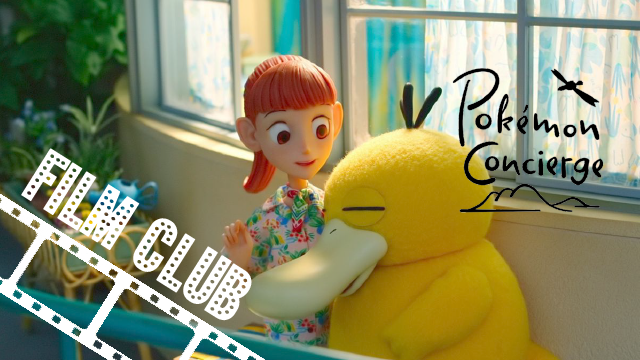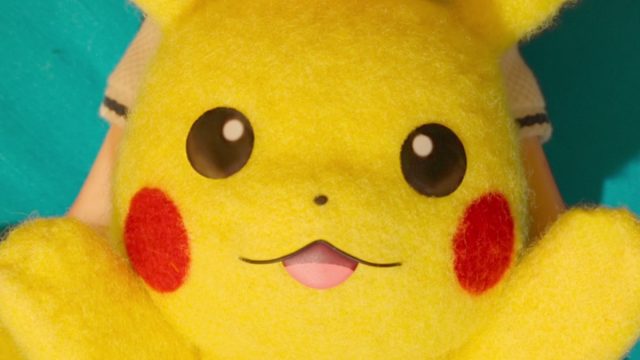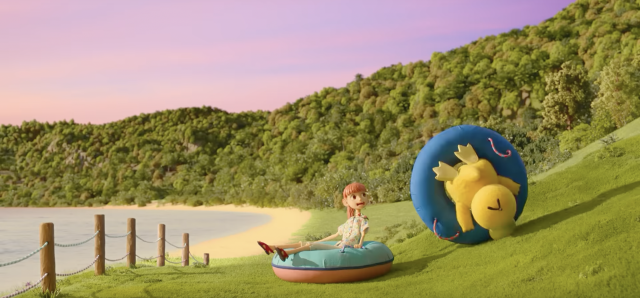Film Club is where we take a look at video game movies and TV shows and offer our impressions and insights. Part review, part reflection, Film Club is a great way to find something new to watch based on all of our favorite pastime.
*Spoiler alert: this article will discuss key moments in the show, including the final moments of the final episode*
At its core, Pokémon is a series about friendships, about the bonds between Pokémon and people and the way they help each other grow. And not just growth in the evolution sense, but personal development and maturation, as well. People help Pokémon develop their abilities and work alongside them, and Pokémon help people be better versions of themselves, teaching them valuable lessons about what really matters in life.
These are themes that come up time and again in the games, anime, movies, and manga, and are central to the story of Pokémon Concierge, the new show that recently debuted on Netflix. While it’s only four episodes totaling a 60-minute run time, the show is one of the most visually beautiful and emotionally compelling things I’ve watched in a while. The stop-motion animation, handled by Dwarf Animation Studios, is stunning and impressive. The lighting is phenomenal, the textures so lifelike, and the expressions on both Pokémon and human alike make it hard to believe there isn’t some amount of life in those little dolls.
I highly recommend checking out this video of the making of Pokémon Concierge. Hearing the creators’ and artists’ philosophies behind the environments, designs, and decision to go with as much realism as possible in the representation of the Pokémon themselves is truly fascinating.
The show centers around Haru, a young woman struggling with many of the stressors of everyday life in modern Japan. Her boyfriend of many years has suddenly broken up with her via text, she’s having work problems, and in general is overwhelmed by the series of unfortunate events and responsibilities she’s shouldering. Deciding to start fresh, she accepts a new role as a concierge at an island resort for Pokémon and their trainers/owners.
Upon arriving to the island, Haru experiences some culture shock and difficulty adjusting to life beyond the hustle and bustle she’s used to. Still very much entrenched in a corporate mindset, Haru thinks her job is to impress her new boss, Ms. Watanabe, with a series of spreadsheets and presentations about how she intends to excel in her new role. She quickly learns that her job is simple: learn how to relax so she can help the Pokémon relax and have fun, too. Put away the laptop, put away the phone (especially since there’s no wi-fi on the island anyway).
Haru is soon introduced to her colleagues, Alisa and Tyler, who show her the ropes at the resort but also impart some much-needed wisdom about how to not only stop and smell the roses, but how to connect with the Pokémon on the island. Both Alisa and Tyler have partner Pokémon — Mudkip and Pansear, Pansage, and Panpour, respectively — who help them with their work at the resort. Ms. Watanabe informs Haru that as part of her transition to island life (Haru might call it “onboarding” in corporate speak), she must bond with a partner Pokémon, too.
It’s not long before we’re introduced to Psyduck, who peeks at Haru shyly from afar but always flees when she tries to approach it. One of the best parts about this show is the relationship building between Haru and Psyduck. It’s paced well (as is the entirety of the show), incredibly sweet, and demonstrates true character building and growth for them as individuals and as a pair. They learn from one another. Haru gradually understands what her true purpose is for the Pokémon on the island, and in turn uses that understanding to help Psyduck control its abilities and find relief from its constant headaches. Psyduck becomes more confident and less terrified, and develops greater command over its psychic powers to help Haru, the resort, and its fellow Pokémon.
Each episode builds on the next, ultimately culminating in Haru finally learning what her strengths are and how she can apply them towards helping Pokémon not just have a great time on the island, but evolve (literally and figuratively) and grow. The strongest example of this is in the final episode, in which a young trainer named Nao comes to the island with his Pikachu to help Pikachu become less timid, less quiet, and more like everyone else’s Pikachu: chipper, cheery, and confident. It was especially interesting seeing a characterization of Pikachu much different than we’re used to seeing in most Pokémon media, especially the anime, in which he’s usually expressive and social.
By contrast, Nao’s Pikachu is very quiet, uncomfortable with speaking above mumbles or whispers, and not at all outgoing. Shy and reserved, he struggles through a series of activities that Haru devises to try to get him to raise his voice. In the end, Haru realizes that her approach may not be the right one, and tells Nao that Pikachu doesn’t need to be like the others — he’s fine just the way he is. As Nao gets ready to depart the island with Pikachu, Haru gifts Pikachu a drawing she did of him and Psyduck while they were sleeping one evening. Pikachu doesn’t look at it until he’s standing on the deck of the ship as it’s leaving port; finally, Pikachu finds his voice and calls out, loudly, to Haru and Psyduck as they stand on the dock waving goodbye.
Pokémon holds a special place in my heart. It was a very formative series on me as a child, growing up in the 90s, and Pikachu in particular is near and dear to me. By the end of the final episode of Pokémon Concierge, I was a blubbering, sobbing mess. It does such an amazing job of creating an incredible, lifelike world where you feel like you could almost reach out and touch the Pokémon. The tiny details in every scene and environment are astounding and a true testament to the skills of every person involved in the production. Painstaking care was put into ensuring every Pokémon was animated accurately, that their movements and expressions reflected how they would actually look and behave if they were real. The show is a moving piece of art. And more than anything, it has so much heart and tells a wonderful story about finding yourself, building lifelong friendships, and how everyone has something to offer and can make a positive difference in someone else’s life.
Director Ogawa Iku said his ultimate goal was “for the viewers to imagine living in a world with Pokémon and how fun that would be,” and that he hoped viewers would walk away from the show wishing Pokémon were real. “If I could stir up those feelings in people, I’ve done my job right.”
Mr. Ogawa, you have certainly done your job right.
To our readers: do yourself a favor and watch Pokémon Concierge. And if you already have, go watch it again. It’s a treasure, and truly something special.




 ShareThis
ShareThis








